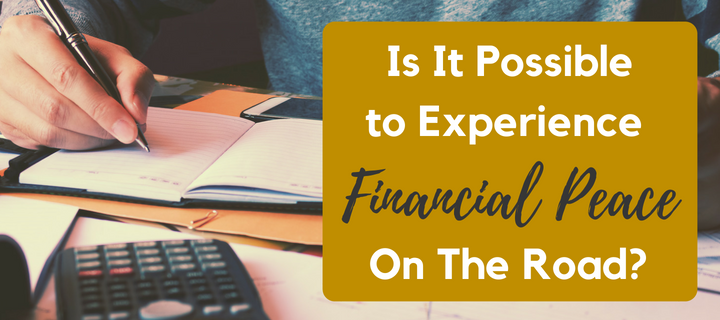Is It Possible to Experience Financial Peace On The Road?

Unless you avoid talk-radio like the plague you've probably heard Dave Ramsey while you've been out on the road. If you have, then you likely know about the cash-based envelope system and his educational series Financial Peace University. While both are amazing resources that we highly recommend, you don't have to go full-on-Dave-Ramsey in order to see the benefits of budgeting. Learning the basics of budgeting is a great way to dip your toe into financial planning for your trucking business, and your life. Here are a few tips for a balanced approach to being a financially responsible driver or owner operator.
First, we can almost guarantee that budgeting doesn't mean what you think it does. Budgeting doesn't mean holding tightly to your money and never spending it. It also doesn't mean that you can only eat Easy Mac every night. You can have as many little luxuries as you want (steaks!) built into your budget. A budget is simply a plan.
Many drivers mistakenly believe that because they have a variable income they cannot budget. That couldn't be farther from the truth! Here are some tips to start a beginner budget even with a variable income.
How to Get Started
1. Look Back at the Last Year
Begin by looking back at your last year of income. Select the lowest income month and create a bare bones budget using just that income. For example, if your average monthly income is $4,000, but it is occasionally anywhere from $3,000 to $6,000, then you would base your monthly budget on $3,000 because you know that is your worst-case scenario. Your worst-case scenario is just that, a worst-case scenario. Nobody hopes for it, but in case it does happen it is best to plan for it.
2. List your Expenses.

Some people find it helpful to do this on paper while others enjoy doing it electronically. If you prefer technology doing the math for you, you can either use Excel or download an app that will help you keep it all straight. One that Dave Ramsey recommends is the EveryDollar app. It is a free download, and is a robust software that walks you through the process of setting up a budget and tracking your expenses.
Write down all of the categories in which you spend money: food, clothing, housing, electrical bills, gas bills, water bills, phone bills, subscriptions, and required payments. Next to each of these categories put the amount that you spend per month in that category. Be honest! This isn't the time to lie to yourself!
3. The Goal is to Get to Zero
In a Ramsey budget, your goal is to "assign" all your money to a category. Each dollar you bring in has a mission. Start assigning your income to the various categories until every dollar has a mission and a category. In an ideal world your income minus your spending will equal zero. That is a zero-based budget, and it is the heart of the Dave Ramsey financial methodology.
4. Go Bare-Bones
If you ran out of money before you got through the required list, then start to ask yourself the hard questions. In a rough month, are there some expenses that can be removed? Are there subscriptions that you can drop? Are there other ways of paying for your needs that are non-traditional?
5. Have a Plan for Months with Extra Income
Now that you know you can make it through a rough month (even if it isn't pretty), you need to decide how to deal with extra money in the good months. The last thing you want is for that hard-earned extra income to get frittered away. It is so easy to spend when we have a good month but then wonder where it went at the end of the month when we do our accounting. You worked hard for that money, so make it work hard for you!
Were there any items on your expense list that went unpaid during the rough month? Prioritize each of those expenses in an ordered list. In the months where you have extra income, go down the expense list one by one. You will know exactly how to assign those extra dollars!
If you run out of expenses, then start to dream. Are there things you want to save for? Luxury items you want to purchase? Do you want to save for a new truck? Save for it in the good months!
6. Track Your Expenses
Whether you use an app or a pen and paper, tracking your expenses is what helps the budget stay on track. Keep your receipts and use them to record your spending habits each day. Be honest and write down your expenses exactly, even if they end up being more than you planned. You can always adjust your budget as you go.
You are almost guaranteed to fail spectacularly the first month or two; but we promise that you will get better and better at budgeting with practice, honesty, and consistency.
One of the greatest ironies of budgeting is that the more you plan, the more freedom you will feel. Financial freedom on the road is possible, but it takes commitment and honesty with yourself. Are you a budgeter? Tell us in the comments below!

